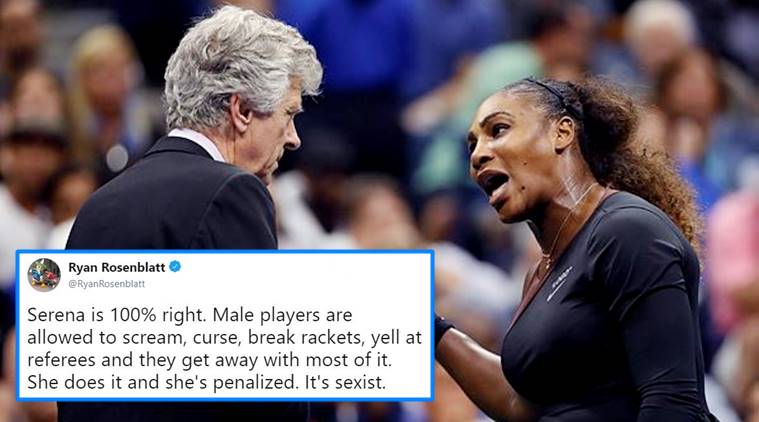I have decided to re-engage online. Over the years, I have periodically posted pieces on LinkedIn, but moving forward, I'm going to focus my attention on this much-neglected blog. Beyond books, I'm expanding my musings to cover other topics: work, life, kids and just random observations.

TALKING LIKE A GIRL

I re-watched the match and read dozens of opinion pieces to help put the US Open Finals fiasco in proper perspective but yet despite doing this and "sleeping on it", the Serena Williams penalties in Saturday’s final still infuriate me. I'm spitting nails, blood-boiling-kind-of-mad.
This year’s final match is and forever will be marred in controversy. It's clear that those ridiculous late-match calls deflated any chance for the all-mighty Serena to mount a thrilling comeback. And for Naomi, it's just not right that a young player’s dream of winning her first Grand Slam was reduced to a nightmare, the moment it became a reality. The officiating of the Women’s Tennis Final at the US Open and the USTA’s response to those controversial calls stink on so many levels. We just can't ignore it.
The ugly truth is clear. Had Serena been a man, her exchange with the linesman would have been interpreted altogether differently. Yesterday, there were no voices raised. No profanities uttered. Serena Williams simply had the audacity to push back and voice her discontent. Because she’s a woman, because she’s a strong black woman, her words were interpreted as wildly offensive and so inappropriate the only recourse was to penalize her. Over and over again.
As I read through other commentary on this, I wasn’t surprised to hear from men who admitted they’ve pushed back way more aggressively on far lesser stages than the US Open Final. Their punishments? Verbal warnings. Why the different treatment for Serena Williams? Why the different treatment for many women -- off the court?
I'm lucky. I’ve never felt thwarted in my career advancement because of my gender, nor uncomfortable working side by side with the men who dominate my industry. But, the truth remains that the rules of engagement are different for me and my female counterparts, especially in the realm of communication. Yesterday’s conflict highlighted this disparity.
I'm lucky. I’ve never felt thwarted in my career advancement because of my gender, nor uncomfortable working side by side with the men who dominate my industry. But, the truth remains that the rules of engagement are different for me and my female counterparts, especially in the realm of communication. Yesterday’s conflict highlighted this disparity.
At work, in the field, and at conferences, I watch women present ideas and challenge others in a far more deliberate manner than their male counterparts. We strive to ensure our interactions are not construed as “emotional”. For me, this has been a challenge because I am passionate about my work and the standards I set for myself, my team and my company. While my “intensity" is respected, I understand it can also reinforce my stature as “a woman”, so in the heat of debate, I work to exercise restraint. The red-faced male colleague dropping f-bombs to emphasize his point is deemed tough, assertive and commands attention. The room responds to his style of discourse. This generally is not the case for a woman pushing for her point of view just as emphatically.
A colleague of mine pointed out that in executive meetings I sometimes back down from arguments and confrontation. This was painful to absorb as well as enlightening (as all the things you don’t see in yourself often are) because in the examples he cited, I didn’t feel as if I was backing away from my position. Rather, I was merely giving up on my ability to be heard. With so many loud, deep voices, mine frequently seemed the easiest to ignore.
My colleague’s comment stings for it begs the question; what kind of example am I setting for other women in my company, those striving for executive roles or simply striving to be heard? How can I drive behavioral and cultural change, if I am not noting this disparity? As a company leader, isn’t it my responsibility to ensure equal interaction for everyone in the room?
A woman can’t be afraid she’ll get “penalized” for speaking her mind. Yesterday, Serena stood her ground and called out what the bad behavior in yesterday’s match really was: sexism.The example set at Flushing Meadows by one of the greatest athletes of our time should inspire all of us to do the same.
From now on ladies, let's channel Serena's strength. From now on, no more talking like a girl!
No comments:
Post a Comment